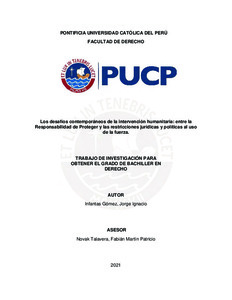| dc.contributor.advisor | Novak Talavera, Fabián Martín Patricio | |
| dc.contributor.author | Infantas Gómez, Jorge Ignacio | |
| dc.date.accessioned | 2021-09-27T22:58:56Z | |
| dc.date.available | 2021-09-27T22:58:56Z | |
| dc.date.created | 2021 | |
| dc.date.issued | 2021-09-27 | |
| dc.identifier.uri | http://hdl.handle.net/20.500.12404/20467 | |
| dc.description.abstract | El presente trabajo versa, fundamentalmente, sobre los problemas jurídicos y políticos de la
aplicación de la Doctrina de la Responsabilidad de Proteger (R2P). Preliminarmente se
realiza una breve reseña histórica de la Doctrina y se analizan los principales elementos
teóricos y normativos que la componen. Con dicha base jurídica la investigación se avoca a
determinar si la Responsabilidad de Proteger puede fundamentar el uso de la fuerza unilateral
por parte de un Estado en respuesta a violaciones graves y sistemáticas de Derechos Humanos
en otro Estado. Con este objetivo central, se analizan los tres ejes problemáticos que enfrenta
la Responsabilidad de Proteger, esto es, el jurídico, el político y el práctico. Para dicho
análisis se contrastan las dos posturas enfrentadas más importantes sobre la R2P: a favor (o
la primacía de los Derechos Humanos) y en contra (o de rechazo al intervencionismo). | es_ES |
| dc.description.abstract | This paper focuses mainly on the legal and political problems of the application of the
Responsibility to Protect (RtoP) doctrine. A brief historical review of the doctrine is made in
advance and the main theoretical and normative elements that compose it are analyzed. With
this legal foundation, the investigations seeks to determine whether the Responsibility to
Protect can be used as a basis for the unilateral use of force by a State in response to serious
and systematic human rights violations in another State. With this central objective in mind,
the three problematic lines that the Responsibility to Protect faces are examined: the legal
one, the political one and the practical one. In this analysis, the two most important
conflicting positions on the issue are contrasted: in favor (or the primacy of the defense of
human rights above everything else) and against (or the rejection of interventionism). | es_ES |
| dc.language.iso | spa | es_ES |
| dc.publisher | Pontificia Universidad Católica del Perú | es_ES |
| dc.rights | info:eu-repo/semantics/openAccess | es_ES |
| dc.rights.uri | http://creativecommons.org/licenses/by/2.5/pe/ | * |
| dc.subject | Derecho internacional humanitario | es_ES |
| dc.subject | Derechos humanos--Violación | es_ES |
| dc.subject | Naciones Unidas--Consejo de Seguridad | es_ES |
| dc.title | Los desafíos contemporáneos de la intervención humanitaria: entre la Responsabilidad de Proteger y las restricciones jurídicas y políticas al uso de la fuerza | es_ES |
| dc.type | info:eu-repo/semantics/bachelorThesis | es_ES |
| thesis.degree.name | Bachiller en Derecho | es_ES |
| thesis.degree.level | Bachillerato | es_ES |
| thesis.degree.grantor | Pontificia Universidad Católica del Perú. Facultad de Derecho. | es_ES |
| thesis.degree.discipline | Derecho | es_ES |
| renati.advisor.dni | 07818599 | |
| renati.advisor.orcid | https://orcid.org/0000-0001-5125-1748 | es_ES |
| renati.author.dni | 73308993 | |
| renati.discipline | 421016 | es_ES |
| renati.level | https://purl.org/pe-repo/renati/level#bachiller | es_ES |
| renati.type | https://purl.org/pe-repo/renati/type#trabajoDeInvestigacion | es_ES |
| dc.publisher.country | PE | es_ES |
| dc.subject.ocde | https://purl.org/pe-repo/ocde/ford#5.05.01 | es_ES |






